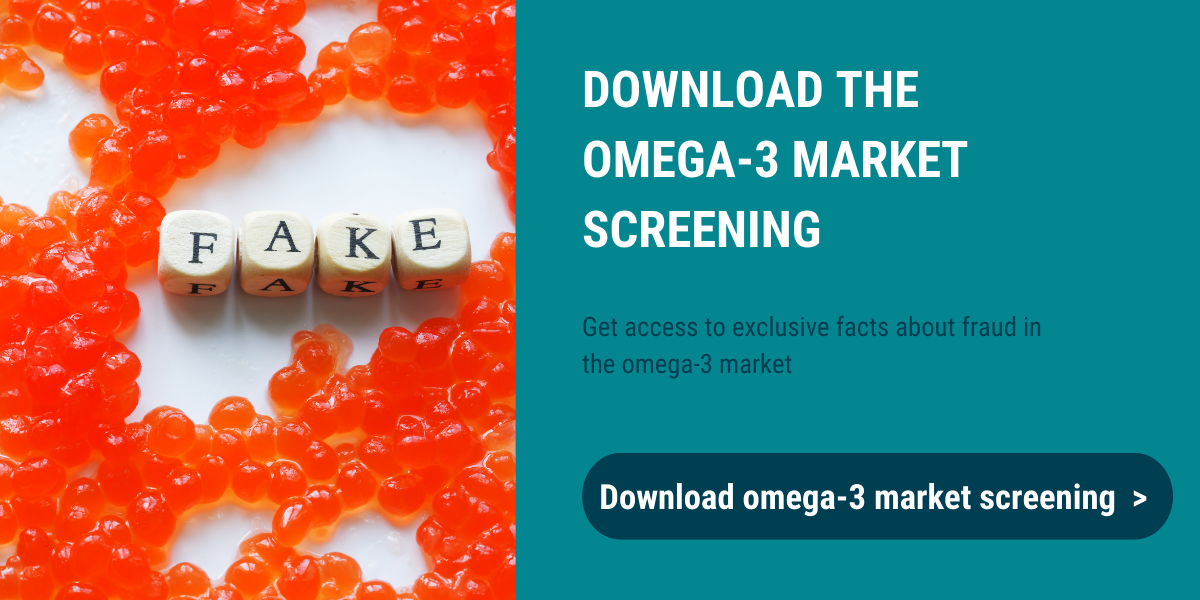How would you feel if the bread you were eating said gluten free on the label, but in fact it was full of gluten, and gave your body a really hard time? In the omega-3 industry, we make sure to avoid this by using third-parties to provide omega-3 certifications.
As a brand it is easy to sell your product and claim the best facts on the label, but in some cases it is useful to use a third-party to secure and strengthen your communication towards the consumer.
As a provider of an omega-3 product, you might wonder what third-parties this could be? Here is an overview of the different providers of omega-3 certifications:
MSC (Marine Stewardship Council)
The MSC cerification is a fishery-based certification and confirms your fishery is well-managed and is sustaining resources and livelihoods for future generations. Being MSC certified means meeting the world’s most recognised benchmark for sustainability: the MSC Fisheries Standard, and your catch can be sold with the blue MSC label.
Hence; MSC is mostly a seafood certification, but omega-3 supplements based on MSC certified fish or krill can also qualify for the blue MSC label on the product.
This omega-3 certification is paper-trial based, meaning most of it relies on documentation the certified company is sending to MSC. The product being certified is not tested or validated physically by MSC.
The MarinTrust certification
The MarinTrust Standard is a tool that enables producers of raw materials in the fish oil and fishmeal industry to prove that they act responsibly. The MarineTrust Standard ensures that the raw materials used in your product comes from responsible fisheries (for instance MSC), as well as ensuring that no unregulated or unreported fishing material is being used as a source to the omega-3 production.
The MarinTrust Standard does not currently involve any product testing.
The Friend of the Sea certification
Friend of the Sea awards sustainable practices in fisheries, aquaculture, fishmeal and omega-3 fish oil. Its certification is meant to be a standard for products and services which respect and protect the marine environment.
The certification is paper-trial based, meaning most of it relies on documentation the certified company is sending to Friend of the Sea. The product being certified is not tested or validated physically by Friend of the Sea.
The IFOS certification
IFOS (International Fish Oil Standards) is a third party testing and certification program used for fish oils. IFOS provides the opportunity for your brand to test product quality, safety and purity. The tests are performed by batch or lot number using direct analysis, to make sure that the product contains the same amount of active ingredients as the label claims.
- Active ingredient content compared to label claims (such as EPA- and DHA level)
- Contaminants
- Heavy metals
- Stability/oxidation
The certification is based on products submitted by the brand being certified, thus relying on the brand not sending fake samples.
The IKOS certification
IKOS (International Krill Standards) is a third-party testing and certification program Basically the same as IFOS, but for krill oils exclusively.
The IVO certification
IVO (International Verified Omega-3) is an organization that works towards increasing consumer confidence in the quality of marine oils and helps consumers identify and select the best omega-3 products for their health.
The organization also advocates and supports responsible marine stewardship, the long term sustainability of fish populations and habitat around the world.
The omega-3 level (EPA/DHA) in your product must be equal or greater than the levels claimed on the label. IVO requires that this is documented by product testing, together with a number of other purity/quality parameters set by omega-3 industry stakeholders (regulatory, trade associations etc). Hence, this certification is similar to IFOS/IKOS.
In addition, to achieve the IVO certification, the fish or krill in your product must be sourced from pristine, cold-water fisheries or sustainable harvests only. This part of the certification is paper-trial based, though, meaning it relies on documentation the certified company is sending to IVO, not by product testing.
The ORIVO omega-3 verification program
ORIVO has delivered evidence-based testing and verification services to the global food, feed and supplement industry since 2014. Today ORIVO is specialized in omega-3, pet food, aquaculture feed and seafood.
When you choose to get verified by ORIVO, your product will be tested by a unique technology developed by ORIVO in close collaboration with world-class R&D institutions. This technology is a NMR-based (nuclear magnetic resonance spectroscopy) laboratory test which verifies a marine ingredient´s authenticity based on species and geographic origin. To ensure authentic samples being tested, one or more products from the consumer-level are being added to the annual testing program, purchased incognito by ORIVO.
When passing the test, you get the opportunity to use the omega-3 verification logo on your product, to show the world that your product comes from a tested and verified marine source.
Since verifying the source is key for the ORIVO omega-3 verification, one might say that ORIVO also is a verification of sustainability, as long as the given source is defined as sustainable by another party.
NSF international GMP certification
The NSF International GMP certification verifies that your manufacturing facility uses proper methods and equipment, as well as having the correct controls in place to produce omega-3 products. To get the NSF international GMP certifiication, your product needs to meet quality standards, as well as being processed, manufactured and labeled in a consistent manner.
NSF is not focusing on sustainability or ingredient origin, hence similar to IFOS and IKOS, but covers a lot more product categories than fish oils and krill oil.
The Green-e certification
Green-e is specialized in clean energy, so that it becomes easier for businesses and individuals to purchase certiified sustainable products and services. The Green-e certification is not specialized in the omega-3 industry or as an omega-3 certifiication, but advocates for clean energy policy, markets and technology.



